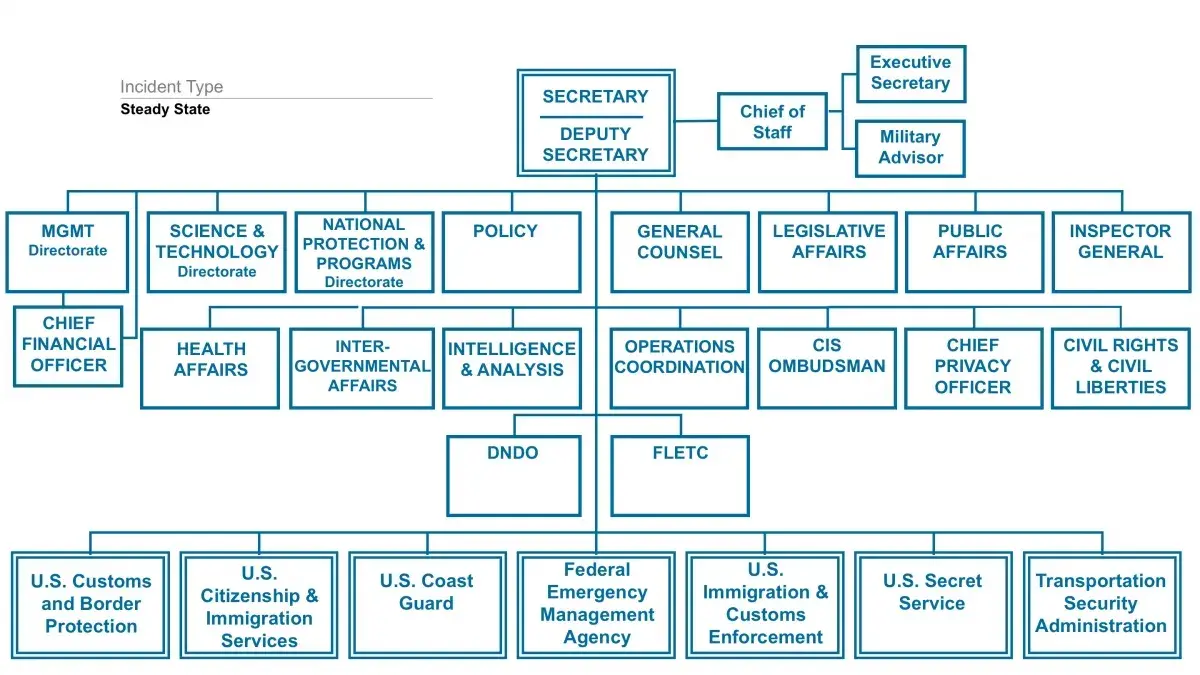Steady State refers to the Department of Homeland Security's activities during normal operations. Here, in brief, is what the many operational and support components that make up the Department are responsible for doing on the day-to-day.

Download "Incident Type: Steady State" (846KB JPG)
Secretary
- Oversees the Department of Homeland Security in its efforts to counter terrorism and enhance security, secure and manage our borders while facilitating trade and travel, enforce and administer our immigration laws, safeguard and secure cyberspace, build resilience to disasters, and provide essential support for national and economic security.
Deputy Secretary
- The second in command of overseeing and ensuring the Department advances its Homeland Security mission.
Chief of Staff
- Oversees for the Secretary the operational and organizational needs of the Department.
- Advises the Secretary and Deputy Secretary on all matters for which DHS has responsibility.
Exec Sec
- Provides all manner of direct support to the Secretary and Deputy Secretary.
Mil Advisor
- Provides counsel and support to the Secretary and Deputy Secretary in matters related to policy, preparedness procedures, and operations between DHS and the Department of Defense.
Office of Public Affairs
- Oversees and manages all external and internal communications for the Department
Domestic Nuclear Detection Office
- Implements domestic nuclear detection efforts
- Integrates federal nuclear forensics programs
Federal Law Enforcement Training Center
- Provides interagency training for Federal, State, local, tribal, campus and international law enforcement officers and agents
Office of Health Affairs
- Community health resilience planning operations
- Oversees early detection monitoring systems for biological and chemical agents
Office of Operations Coordination
- Operates the National Operations Center (NOC)
- Shares and fuses information on a daily basis by the two halves of the Office – the “intelligence side” and the “law enforcement side”
Office of Intelligence & Analysis
- Gathers and disseminates intel between DHS components and the larger U.S. Government Intelligence Community
Directorate for Management
- Ensures all DHS personnel have the appropriate resources they need to advance the Homeland Security Mission
- Oversees budget, appropriations, expenditure of funds, accounting and finance
- Responsible for procurement, information technology systems, facilities
- Tracks and measures performance related to the Department’s responsibilities
National Protection and Programs Directorate
- Works with State, local, and tribal governments, as well as the private sector to monitor, strengthen and enhance the resilience of the Nation’s physical and cyber infrastructure
Office of Policy
- Develops DHS-wide policies, programs, strategies, and plans
- Represents the Department at White House interagency policy meetings
Science and Technology Directorate
- Works with the academic and private sectors to develop technologies for use by law enforcement or for strengthening and improving the resilience of critical infrastructure
United States Customs and Border Protection (CBP)
- Combines customs, immigration, border security and agricultural protection functions in managing the nation’s borders
Federal Emergency Management Agency (FEMA)
- Conducts disaster/hazard preparedness campaigns
- Issues grants to help citizens as their communities recover
United States Immigration and Customs Enforcement (ICE)
- Enforcement and removal operations, whereby ICE identifies, apprehends, and when necessary, removes removable unlawful noncitizens from the United States
- ICE Homeland Security Investigations (HSI) investigates a wide range of activities related to the illegal movement of people and goods—such as human trafficking, drug smuggling, counterfeit goods.
- ICE Cyber Crimes Center investigates illegal activity taking place over the digital domain; including the illegal trafficking of weapons, narcotics, and child pornography
Transportation Security Administration (TSA)
- Screens all passengers entering and leaving the United States
- Protects the nation’s transportation networks including highway, rail, maritime, aviation, urban transit and pipeline
United States Coast Guard (USCG)
- Patrols the nation’s maritime borders and waterways
- Provides assistance to those in peril
United States Citizenship and Immigration Services (USCIS)
- Manages all functions related to lawful immigration and path to citizenship applications
- Processes asylum claims
- Investigates marriage fraud cases
United States Secret Service (USSS)
- Protects the President, Vice President, and other designated protectees
- Investigates counterfeit U.S. currency, complex cybercrimes, network intrusions, bank fraud, illicit financing operations, among others
- Coordinates security operations for events designated National Special Security Events (NSSEs)
